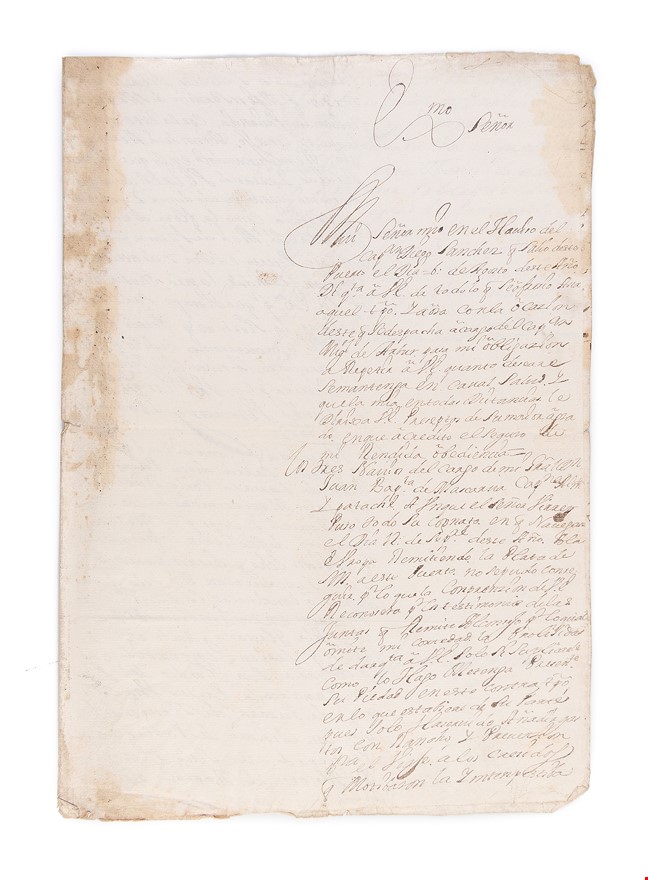ALS to the Duke of Medina Sidonia, in which he gives news of the movements of various fleets.
PINEDO Francisco de (1699.)
£15000.00
Please contact us in advance if you would like to view this book at our Curzon Street shop.
NEWS OF AN ENGLISH COLONY AT MOBILE & THE EXTERMINATION OF THE SCOTCH COLONY AT DARIEN
Manuscript in ink. Bifolium with address panel. 3, [1]pp. Folio. Some pale stains not affecting legibility. Veracruz, 13th November,
A fantastic survival: this contemporary report concerning Spanish actions against perceived pirates challenging their colonial posessions in the Caribbean. Importantly, it gives news of the Scotch Colony at Darien and the English colony at Mobile, Alabama.
The Spanish naval Captain, Don Francisco de Pinedo [here spelled Pineda], reports back to Juan Claros Pérez de Guzman, 11th Duke of Medina Sidonia (1642-1713), with news of various Spanish fleets in the West Indies. He also describes efforts to resist what the Spanish considered to be unlawful attempts at colonization, including the Scots at Darien. Whilst Paterson and the other architects of the expedition saw this initiative as a lawful commercial endeavour, as far as the Spanish were concerned, it was piracy. Still haunted by the memory of Captain Morgan's raids, their zero tolerance policy towards the Scots ultimately led to the arrest of a Captain Pilkington, who was sent to Spain as a prisoner, and were it not for the intervention of King William, would have been hanged for piracy. General Don Manuel de Zavala, whose fleet had been dispatched to reinforce Pensacola Bay against the French, arrived at Darien after the first expedition had evacuated:
[translation]: "Don M. de Zevala left this port [Veracruz] with the ships under his command, to exterminate the Scotch at Dariel [Darien] and these [the Scots] ... demolished the fort they had built there, and leaving the place unfit for occupation returned to the Island of San Thomas to continue their practice of piracy in America."
He continues: "A fleet appeared at Pensacola which proved to be a war fleet of French ships intent upon colonizing the place. They found Don Andres de Arriola in possession, who behaved admirably and having built fortifications on land the present whereabouts of this squadron are not known. Some English residents are established at La Mobila, twenty leagues from Pensacola, in the Gulf of Mexico. It is the place where the fleets pass, and they are in touch with another colony they have founded ... near Campeachy ... God help us, and guard your Excellency's person."
William Paterson (1658-1719) - founder of the Bank of England - was an architect of the Company of Scotland, an organisation intended to stimulate global trade by establishing a Scottish colonial outpost in the New World, specifically Darien in modern-day Colombia. This colony ("Caledonia") with its capital ("New Edinburgh") was established in 1698 on the Caribbean side of the Isthmus of Panama. The intention was that the location would act as an entrepôt facilitating Scottish trade to both Pacific and Atlantic routes, with an overland passage connecting the two. Needless to say, the East India Company did what it could to quash the project from its outset, seeing it as a threat to their powerful trade alliances, particularly with Spain. They initially pursued the company in the courts, preventing any investment from outside of Scotland. As a result, the full £400,000 were raised by public subscription from the people of Scotland alone. The expedition was a failure, initially abandoned in October 1699. News did not reach Scotland in time to halt various relief vessels however, and a second wave of colonists arrived on 30th November. The venture was finally abandoned soon after and had a devastating effect on the Scottish economy.
The experiment failed, first and foremost, because of sickness and unsuitable supplies. However, hostility from the established Spanish colonial presence in the surrounding waters did not help. The Darien colony's location gave it a dangerous proximity to Spanish shipping routes, which were closely guarded to protect the lucrative commodities like silver and cochineal being exported from the Spanish main. As a result of this, the settlers were under observation by the Spanish administration from the start.
Provenance: this manuscript was in Maggs Bros. Catalogue no. 465, Bibliotheca Americana et Philippina Part IV. 1925, price: £25.00.
Stock Code: 210239




